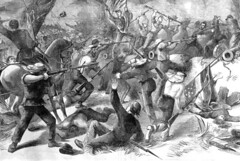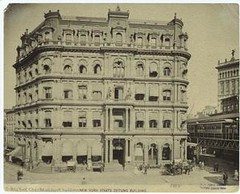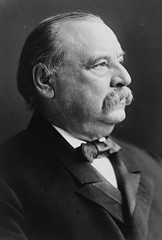From The Peopling of New York City
Contents |
Political Battlefield of New York City
The isolationist practices of the German community made its entrance into the world of politics slow at best. Eventually the German workers and business owners realized that they needed city representation in order to stay competitive in the cut throat world of the New York. One of the first examples of German political participation was the Socialist leaning Cigarmakers' Union. In the general the predominantly Irish city government was opposed to Germans getting any kind of political control. This stemmed from the strong Germanism championed by the population. The feeling was that if such an influence would permeate as far as Washington D.C. then the U.S. would be involved in a unnecessary wars with other countries. To counter the established power of Tammany Hall the German political leaders gathered at Canterbury Hall, also known as Mozart Hall. Fernando Wood was the champion of the Germans in government. He attempted run for mayor 3 times and lost each time, the last time due to a German-American on the ballot. Yet each consecutive time proved the power of the German voting bloc, and the necessity for the politicians to woo them.
German Voting Patterns
In general the whole of the German population were pro-Democratic party. This generally stemmed from fear of assimilation if involved in national issues. [1] However the patterns would sway depending on the party's views on topics such as prohibition, the issue of German unification, and German political patronage. The first one was particularly important since drinking constituted an integral part of the German cultural identity. It simply would not be a Sunday if no beer was served at the beer garden.
The Issue of Slavery
The German stood out as the ethnic group most opposed to slavery. Since the first protest at Germantown, Pennsylvania in 1688 the general view on the issue did not change. However the fear of losing their hard won jobs to the cheaper labor provided by the free blacks outweighed the moral standings held by the Germans. They stuck with the Democratic ticket voting for Stephen A. Douglas in the election of 1860. When the Civil War did break out many of the Germans volunteered for the New York regiments. However this was not due to a direct support of emancipation but due to a desire to prove themselves in the eyes of their fellow citizens.[2] German newspaper "Der Arbeiter" advocated relocating the freed slaves to Africa in order to diffuse the post-war situation.
Business and Politics
Successful German businessmen were highly active politically. Oswald Ottendorfer, the editor of New York Staats-Zeitung, used his paper as a pulpit to expout his political views and sway the German readers to support them as well. He believed in anti-corruption action by the government and thus supported the Democratic party. However who soon grew dissatisfied with their progress and decided to the matters into his own hands. He and William Havemeyer formed the German Reform party and under this banner they managed to elect Havemeyer as mayor and Ottendorfer as alderman. Ottendorfer believed himself capable of wining the mayoral race, even though he lost once before, but decided that he can be more useful as the editor of the New York Staats-Zeitung.
President Grover Cleveland
Prior to his election to the president's office Grover Cleveland was a good friend of William Steinway as well as Oswald Ottendorfer. When he was elected to hold office in 1985 he took the advice given to him Steinway and Ottendorfer very seriously. This was in part to the enormous power those two had within the German community and therefore the voting pool of NY. With Cleveland's help German Americans were able to push though to positions of high power in government and commerce allowing the German business to prosper.



